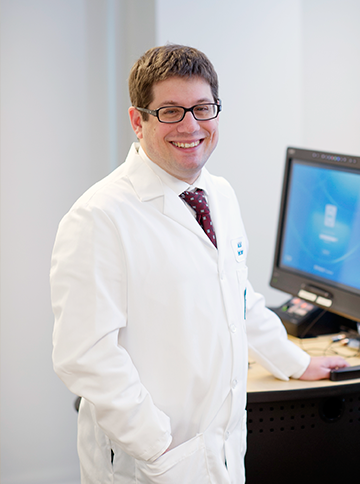Eastern Virginia Medical School
Associate Program Director, Endocrinology and Metabolism Fellowship
 When Dr. David Lieb meets diabetic patients at their initial visit, one of the first things he tells them is that he understands what they’re going through. Those aren’t just empty words: Dr. Lieb was diagnosed with Type 1 diabetes when he was 12 years old, and has been dealing with the disease ever since. “I was always a husky kid,” he says, “and I started losing a lot of weight. I was drinking a lot of water, and urinating with increasing frequency.” While he and his mother were delighted with his weight loss, his father – a practicing dentist who had taught anatomy at MCV – suspected something wasn’t quite right. “My dad had done research on diabetes,” he says, “so he made sure I was tested.” There was no significant family history of the disease, just one great uncle with Type 2 diabetes.
When Dr. David Lieb meets diabetic patients at their initial visit, one of the first things he tells them is that he understands what they’re going through. Those aren’t just empty words: Dr. Lieb was diagnosed with Type 1 diabetes when he was 12 years old, and has been dealing with the disease ever since. “I was always a husky kid,” he says, “and I started losing a lot of weight. I was drinking a lot of water, and urinating with increasing frequency.” While he and his mother were delighted with his weight loss, his father – a practicing dentist who had taught anatomy at MCV – suspected something wasn’t quite right. “My dad had done research on diabetes,” he says, “so he made sure I was tested.” There was no significant family history of the disease, just one great uncle with Type 2 diabetes.
But the tests confirmed his father’s fear: David had Type 1 diabetes, the less common, auto-immune form of the disease in which the body recognizes its own insulin-producing beta cells as foreign, and attacks them. The year was 1989.
It wasn’t necessarily the diagnosis that led Dr. Lieb to a career as an endocrinologist. He’d always been interested in science because of his father’s influence. He majored in cell biology at the University of Maryland, where he was exposed to research as a summer student at the National Institutes of Health. He earned his medical degree at the University of Virginia in 2003, where he first met Dr. Jerry Nadler. “I wasn’t just his student there,” he explains, “because of my diabetes, I was also a patient.” He did both his internship and residency at Oregon Health and Science University before returning to UVA for a fellowship in endocrinology. “Because endocrinology deals with hormones, which affect every part of the body, I knew I’d get to work with many different health care providers,” he says. “That appealed to me.”
As a graduating fellow, Dr. Lieb recalls the email he received from Dr. Nadler, who had come to EVMS and had an opening in the clinical educator program. Eager to work with his medical school mentor – and to work in an atmosphere that would welcome a clinician who also wanted to teach – Dr. Lieb joined the EVMS staff in 2009, reuniting with his mentor as well as with Dr. Aloi, another recruit from UVA.
Today, Dr. Lieb splits his time between caring for patients in all stages of diabetes, teaching, and researching the effects of bariatric surgery on Type 2 diabetes. “We have good therapies for diabetes,” he says, “but nothing works as well as weight loss and dietary changes. Research shows that bariatric surgery is one of the most effective treatments for Type 2 diabetes. The data are striking, and now, both the American Diabetes Association and the American Association for Clinical Endocrinologists mention bariatric surgery in their guidelines for the management of diabetes.”
Dr. Lieb is optimistic about the vast research being done at EVMS, but responds cautiously when patients ask about the possibility of cure. “I remember when I was diagnosed, somebody came into my hospital room and said, ‘don’t worry, there’ll be a cure in ten years.’ Twenty-five years later,” he says, “the technology for managing the disease is worlds different, with wearable sensors that measure blood sugar and pumps that can distribute insulin” – but he emphasizes that diabetes remains a chronic disease that patients have to learn how to live with.
He has reason to be concerned about a cure: as the father of three sons, Dr. Lieb knows that their risk of developing Type 1 diabetes is five percent greater than if his wife had the disease. “There’s something about the Y chromosome,” he says. “We don’t yet know why.”
But a healthy lifestyle can influence the outcome of every diabetic, he tells his patients. Dr. Lieb introduces them to the concept of mindfulness about their diet, their exercise habits and how they deal with stress. “There’s data that these things can really help with blood sugars,” he tells them.
That’s a message he shares with the students he teaches, in addition to their regular medical curriculum. He gives them another piece of advice, as well: choose your study partners wisely. In medical school, he says, he was paired with a fellow student named Emily White. “Emily and I studied together, and worked on projects together, and I fell in love,” he says. Today, Dr. Emily Lieb is a family practitioner working in the Bon Secours system. She sees patients and is the medical director of the Hampton Roads Care-A-Van Mobile Free Clinic.

